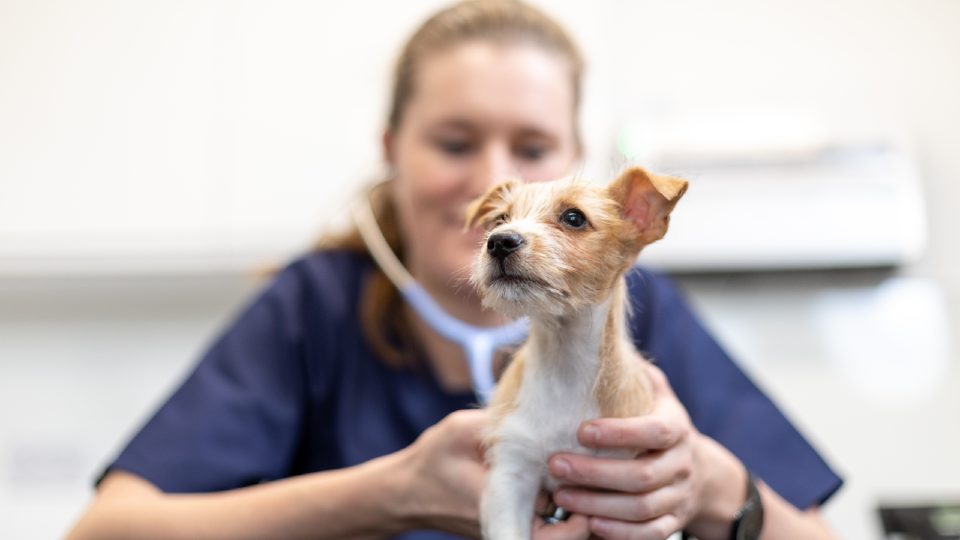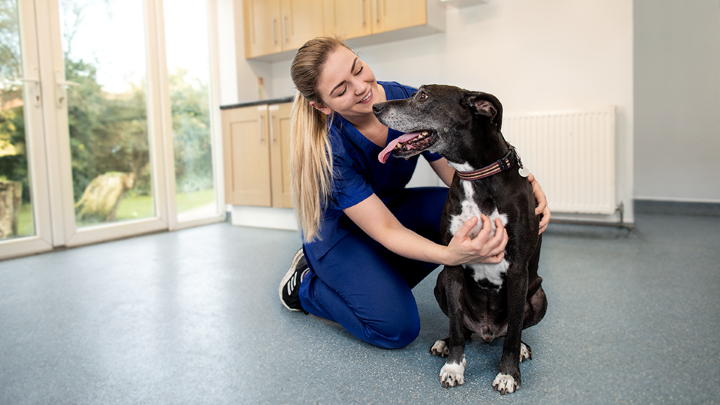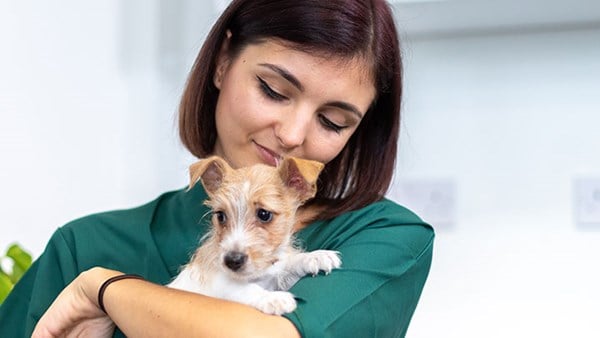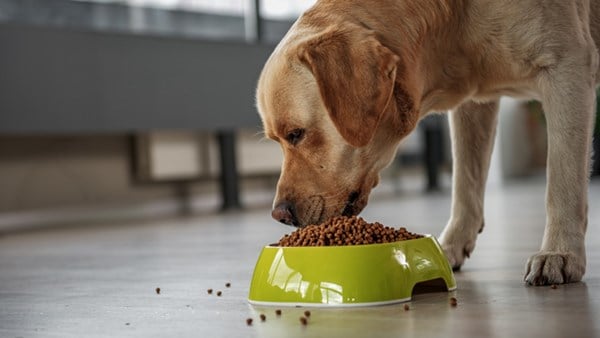Dog Vaccinations And Booster Vaccinations
Regular vaccinations protect your dog from potentially fatal diseases. Find out what’s involved and why they’re essential in keeping your dog safe.

Why do dogs need vaccinations?
Vaccinations and booster vaccinations play an important role in protecting your dog from dangerous and potentially fatal diseases like parvovirus, canine hepatitis and distemper.
Vaccines work by giving your dog a small amount of the bacteria or virus to be vaccinated against; this is usually a modified or dead strain, which is completely harmless.
Doing this exposes their immune system to the virus or bacteria and trains their system to recognise and attack it. This means, should they ever encounter it in the future, your dog’s immune system will be able to successfully fight it off, keeping them safe and healthy.
It's always best to vaccinate dogs as puppies. It helps protect the wider dog community, as they reduce the risk of infection for all dogs in the area.
Read more about advice on being a responsible dog owner.
What vaccines do dogs need?
We recommend that your dog is vaccinated against:
- Canine parvovirus (a.k.a. parvo)
- Canine infectious hepatitis
- Distemper
- Leptospirosis
- Kennel cough
- Rabies (if you plan to travel abroad with your dog)
Your vet will assess your dog’s individual lifestyle and environment to decide which vaccines are essential to keep them safe and healthy.

Vaccinate your dog with the Medivet Healthcare Plan
When you sign up to the Medivet Healthcare Plan, your dog’s vaccinations are included in the monthly cost. This enables you to spread the cost of vaccinations and receive reminders when a vaccination is due.
Other benefits of the Medivet Healthcare Plan include:
- Complete flea, worm and tick protection for the year
- Six month health check by a vet
- Discounts on vet care, dental and food
- Microchipping (if required)
Find out more about the Medivet Healthcare Plan.
What if my dog has missed their vaccination?
If your dog’s vaccination is late or overdue, please talk to your vet as soon as possible. There is a short period of time that can pass before some vaccinations will need to be re-started. Your vet will be able to advise the best option for your dog.
Puppy vaccinations
Puppies are particularly vulnerable to serious diseases like parvovirus and canine distemper, so it’s vital they receive their initial course of three vaccinations.
Puppies should receive their first vaccinations at eight weeks, and it’s common for them to have these via the breeder; always check your puppy’s vaccination history before you take them home. They should then receive their second set of vaccinations at 12 weeks, and their third at 16 weeks.
It’s important not to mix your puppy with unvaccinated dogs until they’ve had all their vaccinations and are fully protected. This is usually two weeks after their second vaccination. It’s worth speaking to your vet about our Medivet Health Plan which covers all puppy vaccinations, as well as a complete flea and worming treatment.
Booster vaccinations for dogs
Many owners believe that once their dog has had their initial round of vaccinations, they’re protected for life. Unfortunately, this isn’t true. Annual booster vaccinations are needed throughout your dog’s life to maintain their protection from harmful disease.
Some boosters are required every year, while others are needed every three years; this is because the protection they offer becomes less effective over time.
The booster vaccinations dogs require are:
- Boosters for distemper, parvovirus and canine hepatitis every three years
- Boosters for leptospirosis and kennel cough every year
Do older dogs still need boosters?
Older dogs still need regular booster vaccinations to protect them from potentially fatal diseases, particularly as their immune system can weaken as they get older.
Speak with your vet about your older dog’s needs to ensure they stay protected in their later years.
How to prepare your dog for vaccinations
Vaccinations are a safe and simple procedure, requiring little preparation from dog owners.

Any visit to the vet can be stressful, and puppies are often nervous, so we recommend bringing along their blanket or their favourite toy to give them a sense of security during the visit. You may also want to keep some treats on hand to reward them afterwards.
What happens at a dog vaccination appointment?
A vaccination appointment provides a chance for your vet to conduct a full nose-to-tail check of your dog to ensure they’re fit and healthy.
If there are no signs of illness or injury, they’ll review your dog’s vaccination history and discuss their needs with you before giving them the necessary vaccines.
The vaccines will be combined into a single injection, which is given at the back of their neck. The only exception is the kennel cough vaccine, which is administered into their nose.
If your dog has previously been unable to have the intranasal kennel cough vaccine, we’re now able to offer a new injectable vaccine against kennel cough. This vaccine is not as effective as the intranasal, please speak to your vet for more details.
Are there any side effects to vaccinations for dogs?
It’s incredibly rare for a vaccination to be associated with severe side effects.
It’s important to remember that vaccines go through rigorous trials before being licensed for use, and a robust reporting process exists to track any possible adverse reaction. This is then investigated and recorded to ensure pet vaccinations are completely safe and effective for long-term protection.
While your pet may seem quiet, under the weather, or off their food for a day or two after their injections, this is short-lived, and they should be back to normal quickly.
Your vet will be able to assess the individual needs of your pet based on their age, overall health and lifestyle to ensure they receive the right vaccinations.
Dog Vaccinations FAQs
Yes, you should attend a vaccination or ‘booster’ appointment every year. Some diseases need to be vaccinated against yearly, such as leptospirosis and kennel cough, whereas DHP is given every three years.
No, it's never too late to vaccinate your dog. Talk to your vet about what vaccinations your dog needs.
It is not a legal requirement for dogs to be vaccinated, however in the UK they must be microchipped by 8 weeks of age, by law.
Rabies vaccinations can only be administered by a vet.
Dogs should get their initial vaccination course as a puppy at 8 weeks of age (often at least two sets of vaccinations four weeks apart) and then attended booster appointments yearly.

Book Your Dog's Vaccination
Find your local Medivet practice and book your dog's vaccination.
Find a practice
Our Healthcare Plans For Your Dog
With the Medivet Healthcare Plan, you can save an average of £285 each year and that’s without discounts that the plan offers on top.
Learn moreRelated Articles

Stay One Tick Ahead Of Lyme Disease
Lyme disease in pets is one of the most common tick-transmitted diseases in the world. Learn how you can protect yourself and your pets from infection.
Read article
Dog Nutrition
It’s very easy to overfeed a dog and this will play a part in their overall health and wellbeing in the future.
Read article
Toxic Bulbs To Be Aware Of
Some Spring bulbs and flowers are harmful to dogs – so keep an eye on your pooch, particularly if they enjoy digging.
Read article
Pet Insurance
Insurance can offer peace of mind, especially in challenging times.
View pet insurance
